ACMA’s 3rd Automotive Raw Materials Conclave And Exhibition
- By MT Bureau
- August 04, 2023
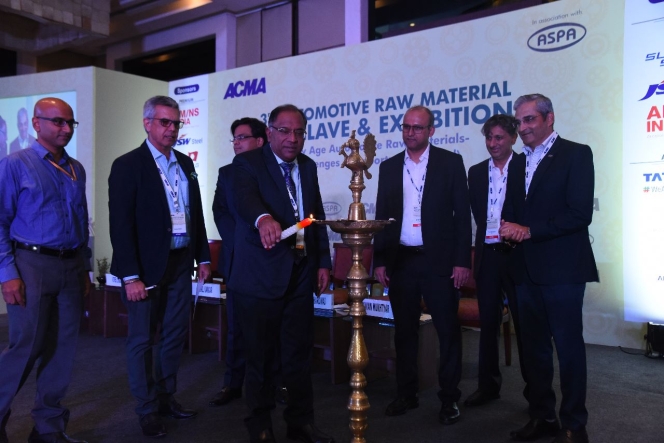
The Automotive Component Manufacturers Association of India (ACMA) in partnership with the Alloy Steel Producers Association (ASPA) conducted the 3rd Automotive Raw Materials Conclave and Exhibition in Delhi recently. Held under the theme ‘New Age Materials - Challenges And Opportunities’, the conclave brought together key stakeholders to discuss the transformative potential of advanced materials in the automotive industry.
Providing insights on how efficiencies can be brough in and how sustainability and circularity could be deployed in case of next-generation materials, the event focused on cutting-edge materials in context with vehicle design, safety and sustainability. It also focused on challenges such as commodity price fluctuations, geo-political instability and geographic material concentration in terms of the transition from traditional raw materials to the new age materials. While a PwC Report presented at the conclave stressed on the above factors, the conference saw experts and industry leaders speak about the convergence of multiple factors like improved vehicle performance and enhanced safety standards in terms of new material choices in components for automotive applications.
Gopalakrishnan Ganesan, Deputy Secretary, Ministry of Steel, Government of India, said, “We've witnessed remarkable progress in the automotive and steel industries over two decades, complementing each other and aligning with government goals. The PLI Scheme for Steel has been a driving force, especially for alloy steel in fostering innovation. The Government, the Steel Industry and the Automotive industry, together need to forge a self-reliant innovative future, creating ground-breaking products in advancing the nation.”
Vinnie Mehta, Director General, ACMA, expressed, “In this era of rapid technological evolution and environmental consciousness, the automotive sector finds itself at a critical juncture. The convergence of electrification, autonomous driving, and the pressing need for eco-friendly transportation necessitates a radical rethinking of raw materials.” “At ACMA, we firmly believe that challenges are opportunities in disguise. The complexities that lie ahead, from securing a stable supply of critical minerals to scaling up the production of new-age materials, present us with opportunities to innovate, collaborate, and create lasting impact. This conclave provides us with an ideal platform to forge partnerships, share knowledge, and collectively shape a sustainable roadmap for the industry,” he added.
The key themes explored during the 3rd Automotive Raw Materials Conclave and Exhibition were,
Advancements in lightweight materials and their impact on fuel efficiency and environmental sustainability.
High tensile strength alloys and their contributions to vehicle safety and performance.
Sustainable manufacturing practices and their role in reducing the automotive industry's ecological footprint.
Emerging trends and innovations in automotive materials, presenting opportunities for growth and competitiveness.
Sunil Kakkar, Senior Executive Director, Maruti Suzuki India Ltd., and the chief guest of the event averred, “In the rapidly transforming automotive industry, we see significant challenges and opportunities. The regulatory environment in India is aligning with global norms, and trends like connected, autonomous, shared, and electric mobility are shaping the industry’s future. Despite the pandemic, the industry has shown resilience, and our unsaturated market offers vast growth potential. Collaboration between steelmakers and the automotive industry is crucial to meet the safety, emission, and light-weighting needs of the industry. We are committed to a greener, safer, and more innovative future, embracing ESG measures for a sustainable ecosystem.”
Several alloy steel manufacturers also displayed their next-generation products at the event.
ZF, BMW Sign Long-Term Supply Agreement For Drive Technologies
- By MT Bureau
- February 03, 2026
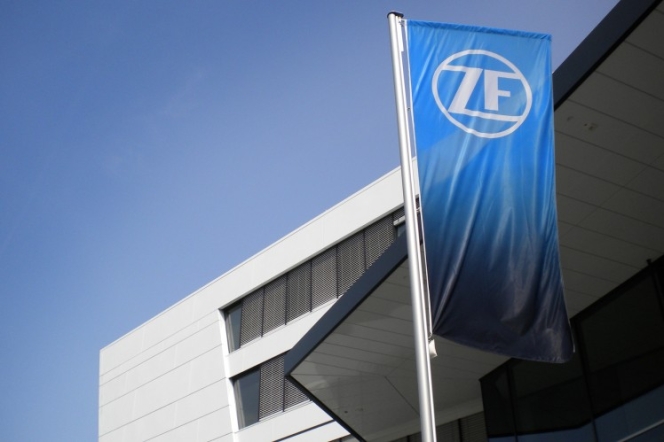
German tier 1 supplier ZF Friedrichshafen and the BMW Group have entered into a long-term supply agreement for passenger car drive systems. The contract, valued at several billion euros, extends until the late 2030s.
The agreement focuses on the supply and continued development of the 8-speed automatic transmission (8HP). The partners aim to support low-emission mobility and maintain technological flexibility during the industry transition.
A central component of the partnership is the technical evolution of the 8HP transmission kit to meet the requirements of electrified drives. The development will focus on increasing efficiency and performance for future vehicle concepts.
Mathias Miedreich, CEO of ZF, said, “Together with BMW, we are sending a strong signal for innovation, efficiency, and sustainability in an industry undergoing dynamic change. This agreement highlights the strategic importance of our 8-speed automatic transmission as a key technology for the transformation of drive systems.”
The duration of the contract provides both ZF and BMW with planning stability in a changing market. ZF aims to strengthen its position as a system supplier while reducing risks through close collaboration with the carmaker.
Sebastian Schmitt, Head of ZF's Electrified Drive Technologies division, explained, “The new agreement with BMW shows how important long-term planning horizons are for technological advancements. It creates clarity and stability for both companies and enables us to align the next generation of the 8HP specifically toward efficiency, performance, and long-term viability.”
Leapmotor Selects Aumovio For Safety Technologies
- By MT Bureau
- February 02, 2026
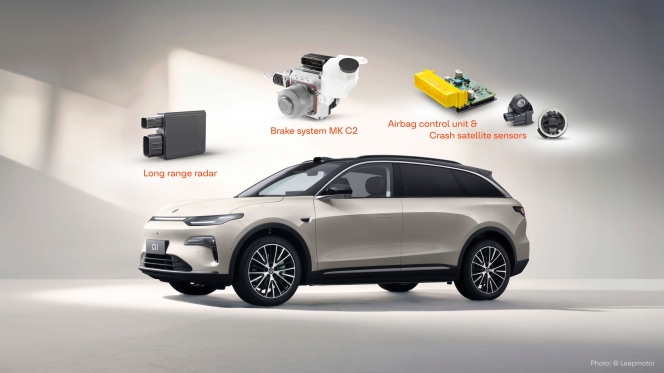
Aumovio has entered a supply agreement with Chinese electric vehicle manufacturer Leapmotor to provide safety components for the carmaker’s B and C platforms.
Several models within Leapmotor’s B platform now utilise Aumovio's long-range radar, electric parking brake and airbag control unit (ACU). Models on the C platform, including the C10, C11 and C16 SUVs, feature the latest generation of the MK C2 one-box brake system, alongside the long-range radar and ACU.
The project was completed with a development cycle approximately one-third shorter than traditional automotive timelines. Aumovio attributed its speed to ‘local-for-local’ strategy in China, where the company operates 20 sites and employs around 10,000 staff. In 2024, Aumovio held a 14 percent share of market revenue in the region.
The supplied technologies include:
- MK C2 Brake System: A unit combining the master cylinder, electronic brake system, and brake booster. It is produced locally in Shanghai.
- Long-Range Radar: A sensor with a detection range of up to 280 metres, used for driver assistance across both platforms.
- Airbag Control Unit (ACU): Integrated with crash satellite sensors, these components are manufactured in Changchun.
Boris Mergell, Head of the Safety and Motion business area at Aumovio, said, “Pairing ‘China speed’ with ‘German quality’ technologies helped us to support a rapid roll-out with our latest safety technologies. This underscores Aumovio’s course towards an adaptive powerhouse that works flexibly and closely with customers to innovate. It also shows that we continue to strengthen our customer relationships in the important market China.”
The partnership supports Leapmotor’s international presence. The B10 and B05 models, which feature Aumovio's ACU and radar technology, were showcased at the IAA 2025 in Munich as part of the manufacturer's European entry.
LTTS Secures Multi-Year Deal From Automotive OEM For Engineering And R&D
- By MT Bureau
- January 28, 2026
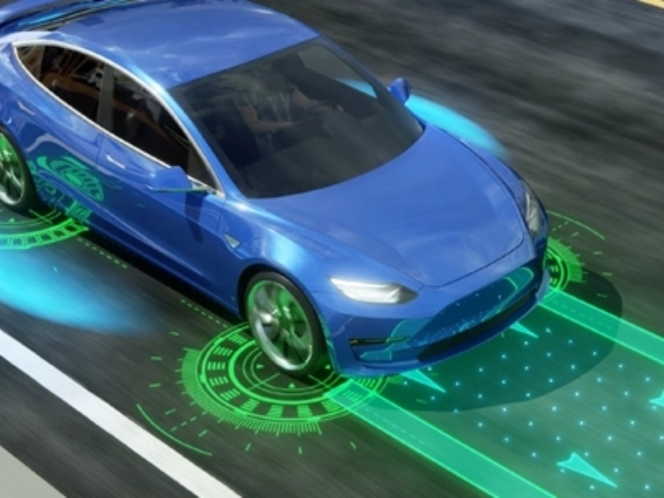
Bengaluru-headquartered ER&D company L&T Technology Services (LTTS) has announced a multi-year engagement within its mobility segment from an automotive manufacturer. The agreement involves software, connectivity and digital engineering services across vehicle technology domains. This win follows the company’s investments in R&D labs and mobility infrastructure designed for programs with global manufacturers.
The engagement covers mobility engineering capabilities, including embedded systems, digital platforms, verification and validation, cloud integration and cybersecurity. LTTS intends to use its engineering expertise and delivery frameworks to support the customer's technology roadmap.
At present, LTTS operates 22 design centres and 100 innovation labs globally.
The agreement strengthens the partnership between LTTS and the automotive manufacturer in the area of mobility engineering. The company provides design, development, and testing services across the mobility, sustainability, and tech segments.
Alind Saxena, Executive Director and President, Mobility and Tech at L&T Technology Services, said, “We are proud to deepen our partnership with the valued customer through this strategic engagement. LTTS brings together domain-led engineering, secure development practices and excellence in global delivery to accelerate the future of premium mobility. The win reflects the trust placed in our teams and our commitment to delivering world-class engineering at scale”.
Valeo And NATIX Network Partner To Develop Open-Source World Foundation Model
- By MT Bureau
- January 25, 2026
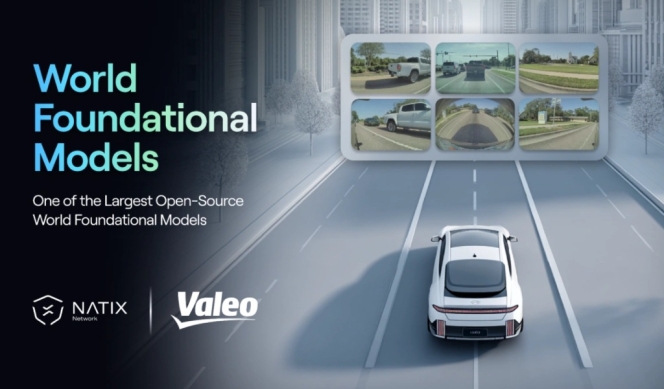
French technology company Valeo and NATIX Network have announced a partnership to develop a multi-camera World Foundation Model (WFM). The project combines Valeo’s research in artificial intelligence and generative modelling with NATIX’s decentralised physical infrastructure network (DePIN) to create an open-source platform for autonomous driving and robotics.
The initiative aims to move beyond perception-based models by creating a system capable of predicting future states and reasoning about physical interactions in a four-dimensional environment. The model will be trained using NATIX’s data network, which has collected 600,000 hours of video data across the US, Europe and Asia over seven months. This data provides the multi-camera inputs necessary for the spatial perception required by autonomous vehicles and robots.
The partnership builds upon Valeo’s existing open-source frameworks, VaViM (Video Autoregressive Model) and VaVAM (Video-Action Model). While these frameworks were previously trained primarily on front-camera datasets, the integration of NATIX’s multi-camera network expands the AI’s field of vision to 360 degrees.
Under the open-source framework, the partners will release models, datasets and training tools. This approach is intended to allow the research community to fine-tune models and benchmark physical AI across various driving conditions and geographic regions. The collaboration seeks to accelerate the deployment of end-to-end AI models by learning from real-world edge cases captured by vehicles in operation.
Marc Vrecko, Chief Executive Officer, Valeo’s Brain Division, said, “Since our creation in 2018, Valeo’s AI research center has been at the forefront of AI research in the automotive industry, especially in the fields of assisted and autonomous driving. Our goal has always been to advance mobility intelligence safely and responsibly. By combining Valeo’s generative world modeling research expertise with NATIX’s global multi-camera data, we are accelerating both the quality and the accessibility of next-generation end-to-end AI models, enabling the research community to build upon strong open models.”
Alireza Ghods, CEO and Co-Founder, NATIX, added, “WFMs are a once-in-a-generation opportunity — similar to the rise of LLMs in 2017–2020. The teams that build the first scalable world models will define the foundation of the next AI wave: Physical AIs. With our distributed multi-camera network, NATIX has a clear advantage of being able to move faster than large OEMs.”







Comments (0)
ADD COMMENT